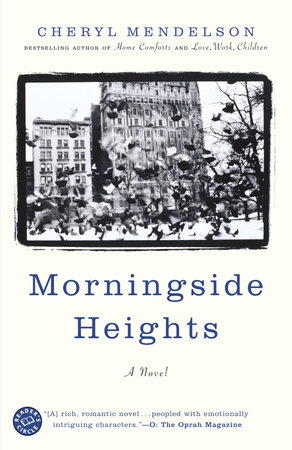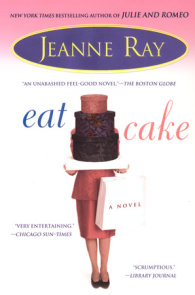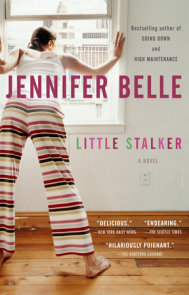READERS GUIDE
Questions and Topics for Discussion
1. Anne Braithwaite is extravagant and feels so entitled to her customary luxuries and privileges that it wouldn’t be far wrong to call her spoiled. Is it consistent, then, to describe her as also generous, warm, and empathic? Why or why not?
2. Is Anne’s optimism a flaw or a virtue? Is she a likeable character?
3. Anne refuses to get a job, insists on staying home to care for her children, and thinks day care is wrong. Both Charles and Anne dislike abortion and divorce. Moreover, despite their politics, both feel entitled to the high status that they are losing as the world changes. Would it be fair to describe them as cultural conservatives? Are the values that guide their private lives consistent or inconsistent with their political left-liberalism? Do you agree or disagree with these values? Do you think your own values are consistent with your political beliefs? Do you identify with Charles and Anne?
4. Merrit thinks her psychotherapy had little or nothing to do with her finally being able to let herself love Morris. Is she right or wrong? Despite her psychotherapy, or, at times even because of it, she grows more and more unhappy until the events described near the end of the book. Would she have been better off if Dr. Freilich had prescribed antidepressants instead of pushing for insights? What’s your own general view on the effectiveness of psychotherapy as opposed to prescriptive anti-depressants?
5. Morris Malcolm, an atheist who hates religion, worships science, and accepts Darwinian evolution as a scientific given, is a Republican who thinks of himself as a social liberal. Although he very much wants his baby with Merrit, he does not disapprove of abortion per se. And unlike the Braithwaites, he has had many girlfriends and, for years, lived with someone whom he refused to marry. Given these significant differences in values and style, what accounts for the depth of friendship that exists among the three of them? Would you find the terms “conservative” or “liberal” helpful in understanding their differences?
6. Is the friendship between the atheistic Braithwaites and Greg Merriweather, an Episcopalian priest, realistic? Is Greg’s friendship with Morris realistic?
7. Greg seems to have a number of serious religious doubts, an obviously non-literal way of reading the Bible, and questions about his vocation. Should he give up the priesthood? What explains why such a gentle, accommodating, sweet-natured, and just plain good man would be prone to such aggressive religious doubt? Do you think Greg is a believable character? Have you ever met anyone he reminds you of?
8. . Greg thinks, sadly and with compassion, that the Braithwaites and their friends have never really faced up to the fact that someday they have to die. What does he see in them that makes him think so? What connection is the author making between Lizzie’s death and the Braithwaites’ blindness?
9. In some peculiar way, Becker responds emotionally to Anne when she goes with Charles and the priests to his law office. She gets his attention, and he aims a good deal of his persuasive lying at her — even though she mistrusts him and conceals her real attitude towards him. Why does Becker react to her this way? Father Quincy detests Becker. How would you describes Anne’s attitude to Becker? Although the author tells us little of Greg’s response to Becker, do you thinkwould it be more like Father Quincy’s or Anne’s? Justice Jacobs is patient and calm with Becker. She speaks to him “not unkindly” even though she sees through him completely and obviously understands the enormity of his crimes. Given the terrible nature of those crimes, would you prefer that the judge be angrier and more critical–more of a “hanging judge”?
10. Do you blame Lily for agreeing to marry Morris while knowing that she cannot offer him the kind of love and marriage he wants? Do you think she understands her own motives? What is the nature of her feelings for Jonathan Riesbeck? Is their decision to live together, apparently platonically, tragic or happy or something in between?
11. The Braithwaites are saved from being forced out of Morningside Heights by some fairly unlikely events — from Greg’s willingness and ability to jump in to help legally, and the peculiarity of Lizzie’s singling them out as her heirs, to the accidental way that they discover what’s in the potato bin, and even the strangeness of relying on something like a potato bin. What point is the author making with such obvious insistence on being unrealistic?
12. The author shows, at various points, that her protagonists rely on religion, the insights of psychoanalysis, science, the classical arts, the liberal arts, the ultimate humanity of our legal system, and progressive humanitarian politics — but without realizing it, and without realizing how precarious is the survival of all these institutions and cultural artefacts. With these facts in mind, as well those listed in question 11, what do you make of the suggestion, on the book’s last page, that Morningside Heights might be as likely to remake its newcomers as to be remade by them? Of Anne’s optimistic confidence that in thirty years Morningside Heights won’t be much different, in essentials, from what it is today? Do you know any places in your own life that have changed this way? Have similar changes ever profoundly affected your own life or the life of anyone you know?




















